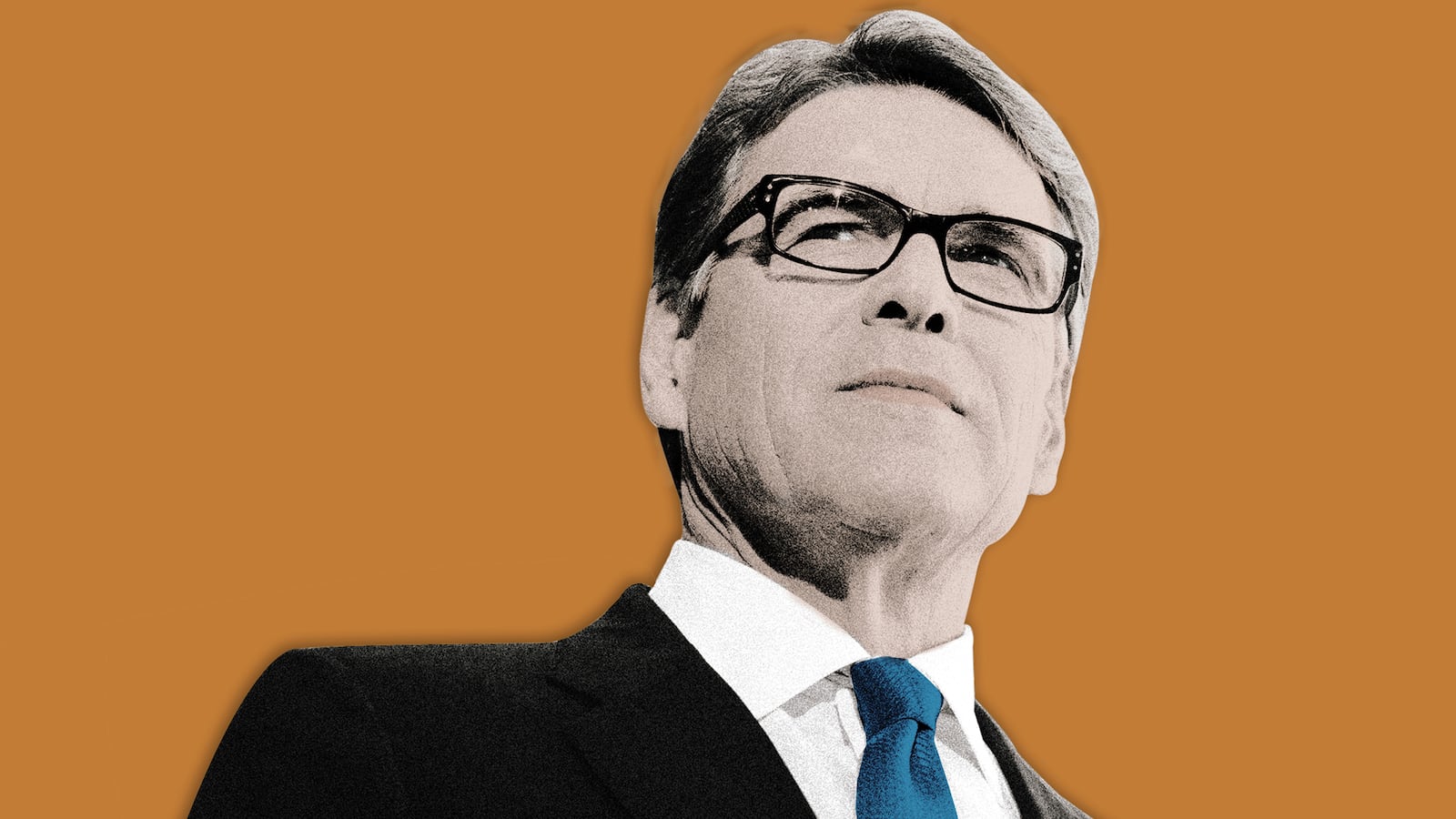President Donald Trump’s cabinet is under siege—mired in scandal and under fire for controversial policy moves or dicey ethical missteps. Several department chiefs are facing the prospect of investigations or withering congressional testimony. Others are facing demands from Democratic lawmakers to resign.
And then there is Rick Perry, Secretary of the Department of Energy, who has managed a relatively stable existence amidst a dumpster fire of scandal that surrounds him.
The former Texas governor and two-time presidential candidate was among the more curious of the Trump hires, tasked with leading a department whose mission he seemed to not understand. More than two years into his tenure, however, he has been so under the radar that many in Washington seem to have forgotten that he is still around at all.
“I never hear anything about Rick Perry,” Rep. Seth Moulton (D-MA) told The Daily Beast off the House floor last week. “Isn’t he the head of the department he called for abolishing?”
Indeed, the man who could famously not remember the name of the agency he now leads has, in the eyes of some in Congress, turned it into a nonentity, which may be just about the safest move one can make in this tumultuous era of governance.
“I think most people forgot Rick Perry is in the government,” said Rep. Dan Kildee (D-MI). “To be honest with you, he’s doing nothing. He has done a good job of being the kid who hides in the back of the class.”
Perry cuts a different profile than the last two men to lead the department that runs the country’s nuclear program and oversees broader U.S. energy policy. Ernest Moniz, a nuclear physicist at MIT who negotiated the Iran nuclear pact, and Steven Chu, a Nobel Prize-winning atomic physicist, both served under Barack Obama.
Perry, by contrast, had spent most of his career in politics, with no background at all in nuclear or atomic physics, when he was tapped by Trump. His credentials for the post was that he had run a state with a large oil and gas industry—a biographical detail that critics said made him better suited to run the Department of the Interior or the Environmental Protection Agency.
But he did have one asset that others in Trump’s cabinet seemed to lack: political savvy.
“He has over 20 years experience of being a high profile statewide elected official. When he was elected statewide in the 90s, the Democrats were large and in charge in Texas and there was an aggressive press,” said Dave Carney, who has worked as an aide and adviser to the former governor. “Because of that, you understand what is allowable and not.”
Slightly more than a year into office, outlets were beginning to notice that Perry was surviving just fine in an administration with a historically bad personnel turnover record. More than a year after that, Democrats and Republicans alike continue to have good things to say about Trump’s pick.
Sen. Joe Manchin (D-W.V.), the top Democrat on the Senate panel with jurisdiction over the Department of Energy, offered effusive praise for Perry—whom he considers a friend—noting that the two worked together when Hurricane Katrina struck and both were governors of their respective states.
“As Secretary of Energy, he has demonstrated an understanding of the urgent need to invest in carbon capture technology and other R&D programs. He also understands the value of an Appalachian storage hub to American energy and national security,” said Manchin, referencing a proposed mega-project that would develop an expansive fracking industry in Appalachia.
The Department of Energy did not return a request for comment.
Watchdogs caution that absence of scandal does not mean it doesn’t exist. The ethics and advocacy group American Oversight obtained documents from the government suggesting that Perry played a role in the Trump administration’s push to sell nuclear technology to Saudi Arabia, a move that raised significant ethical questions. As the Daily Beast reported in March, the DOE under Perry authorized U.S. companies to work with Saudi Arabia on nuclear energy even as the Saudi government faced intense scrutiny over the murder of Jamal Khashoggi.
“It is far too early to give him a clean bill of ethical health,” said Austin Evers, founder of American Oversight. “Perry may not have engaged in cartoonish behavior like Scott Pruitt, but that doesn't make his tenure scandal-free by any stretch.”
Nor is it accurate to call Perry’s record entirely clean. In 2018, Perry did face scrutiny for using old campaign funds to pay for his wife to join him on official government business trips abroad. DOE said at the time that this practice did not violate ethics rules; and the dust-up paled in comparison, for example, to the ethically dubious private plane use that drove former Health and Human Services chief Tom Price from office in 2017.
“He’s not as egregiously unethical and all that, I suppose,” Sen. Mazie Hirono (D-HI), a member of the Senate’s energy panel, said of Perry, “but maybe his time will come.”
To some Democrats, Perry’s non-relevance is not synonymous with a job well done. Whereas Moniz, for example, played an instrumental role in hashing out complex negotiations over Iran’s nuclear program, Perry has been utterly absent from any similar discussions as the United States and Iran find themselves, once more, on the brink of military conflict over the latter’s nuclear ambitions.
Indeed, a look at Perry’s Instagram feed reveals that he is prioritizing the promotion of the country’s domestic energy sector—particularly the export of natural gas, which the DOE has dubbed “freedom gas.” In May, Perry posted a photo from a port in Belgium, boasting it was the most recent of 35 countries to be receiving imports of American liquefied natural gas. Along with the photos of Perry’s visits with foreign government officials in the U.S. and abroad are evidence of other elements of DOE business, like touring solar panels and supercomputer sites and meeting with members of Congress.
While Perry has soldiered on with little fanfare, his Cabinet colleagues have not been so lucky. Democrats have called on Commerce Secretary Wilbur Ross to resign over inconsistencies in congressional testimony; they have called on Housing and Urban Development Secretary Ben Carson to resign over an apparent failure to grasp critical policy details; and on Education Secretary Betsy DeVos to resign over using “racist research” to justify a school discipline policy. They have called on Health and Human Services chief Alex Azar to resign over his department’s handling of the needs of migrant youth in government custody; and Labor Secretary Alex Acosta to resign over his role in brokering a cushy plea deal for accused serial sex offender Jeffrey Epstein. And they have called on Attorney General William Barr to resign over his handling of Special Counsel Robert Mueller’s investigation.
But no one has made the same demand of Perry. And that may well be because, compared to Cabinet officials who have worked to diminish their agencies’ mandates, the man who once called to eliminate DOE has, ironically, not acted like it.
According to Sen. Brian Schatz (D-HI), Perry “has chosen not to do violence to his agency.”
“That’s half the battle. He seems to have demonstrated that he’s capable of leading an executive branch agency in a responsible manner that makes him stand out,” said Schatz as he headed into a Senate subway train. “I don’t want to get him into trouble!”








